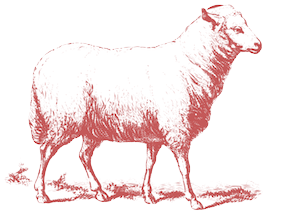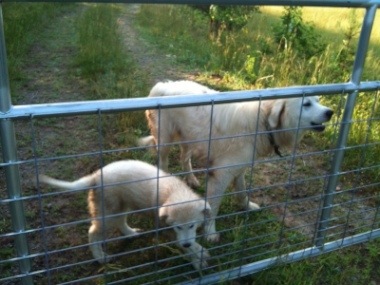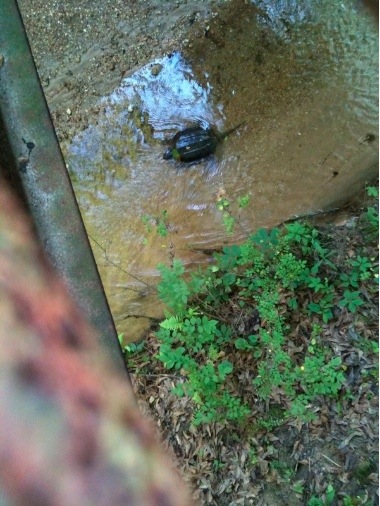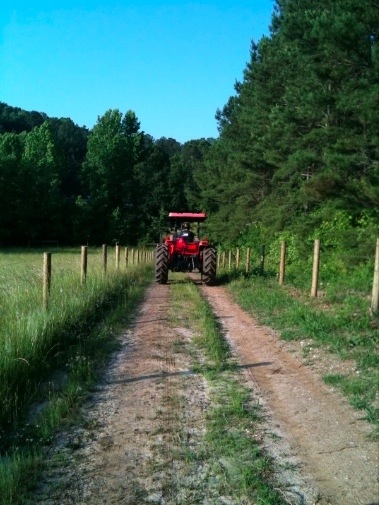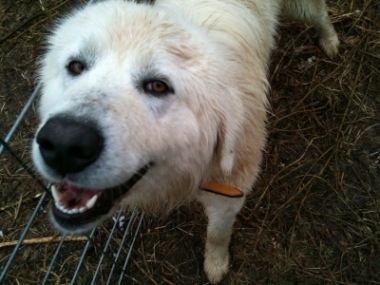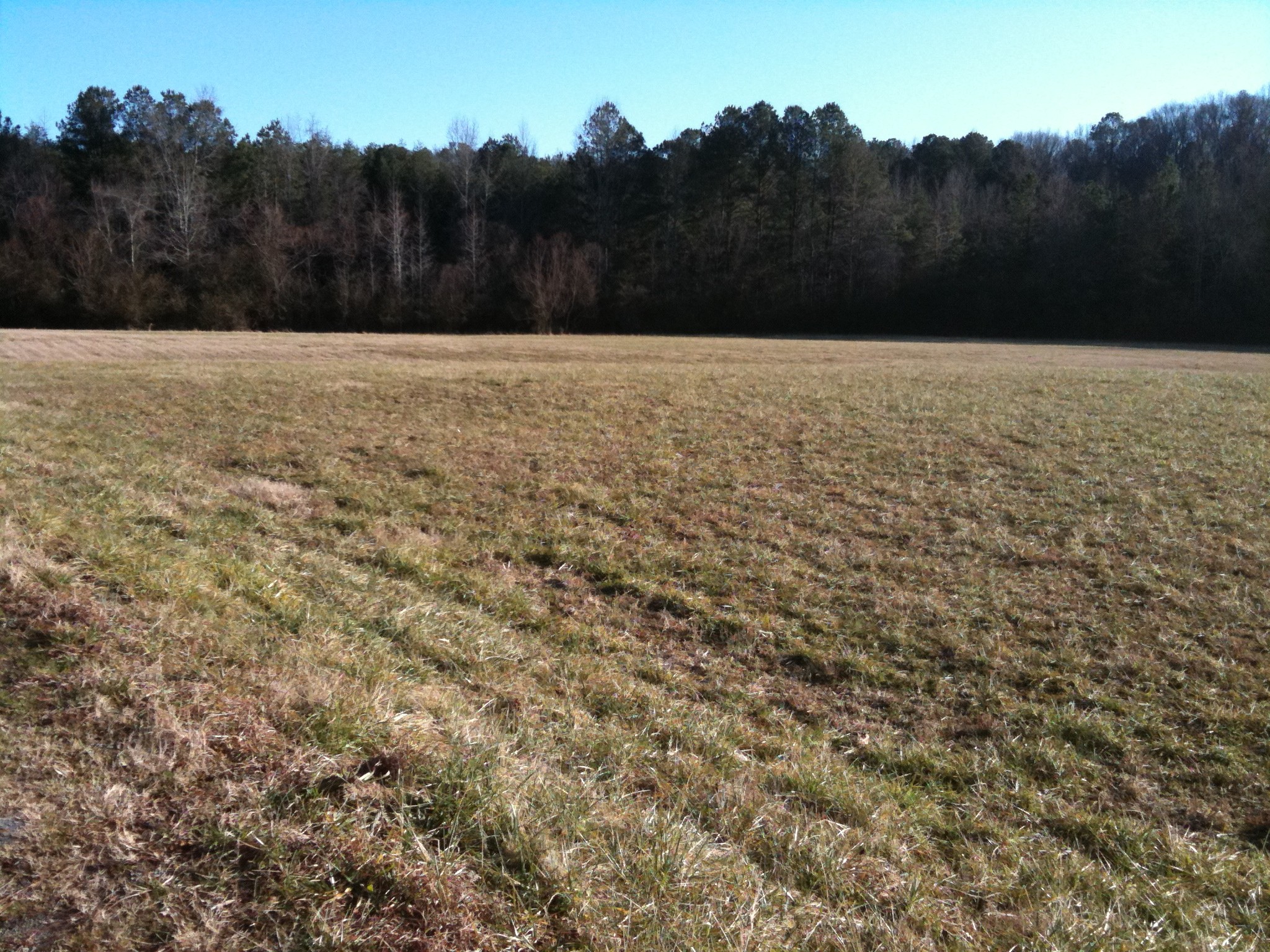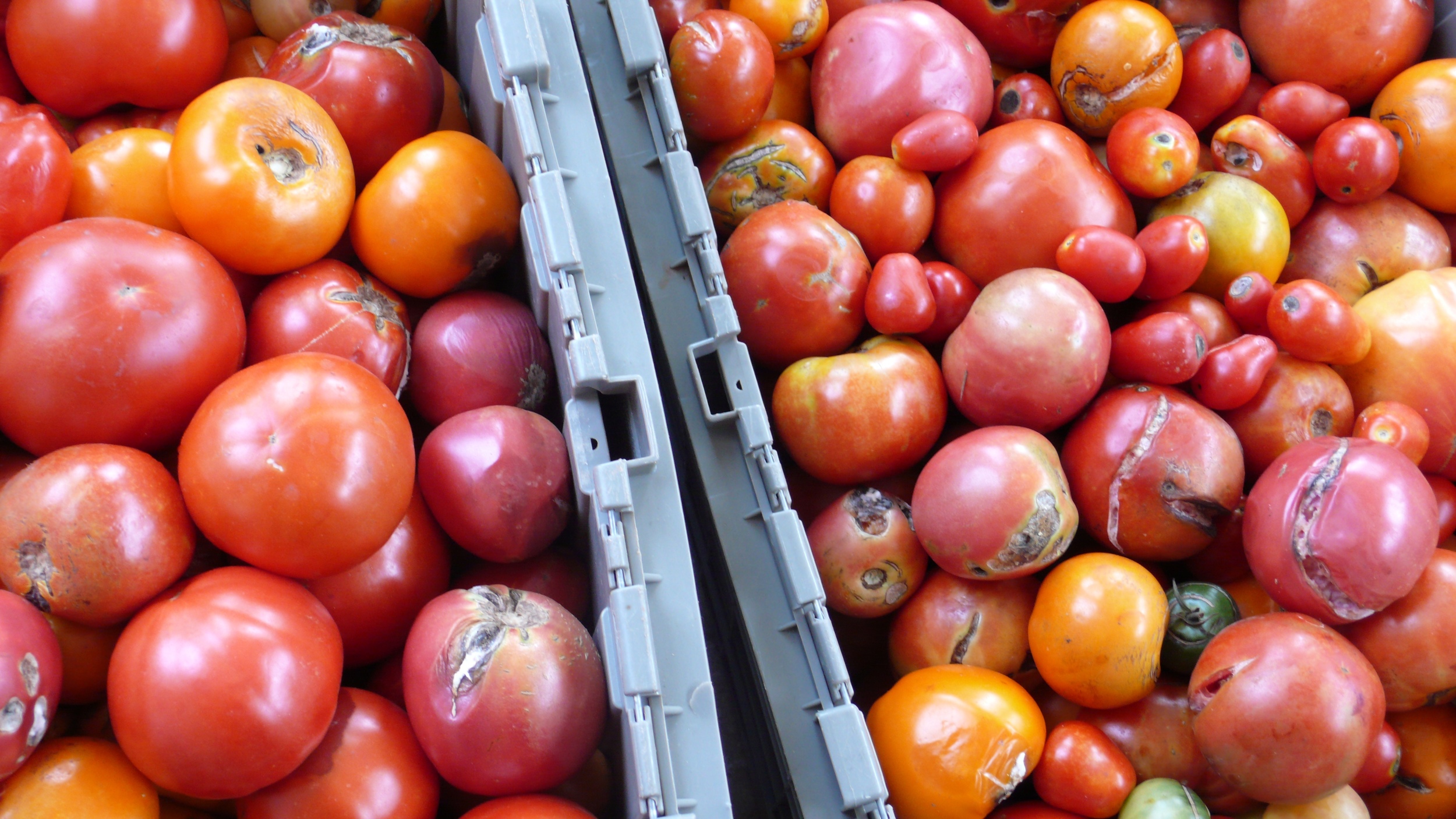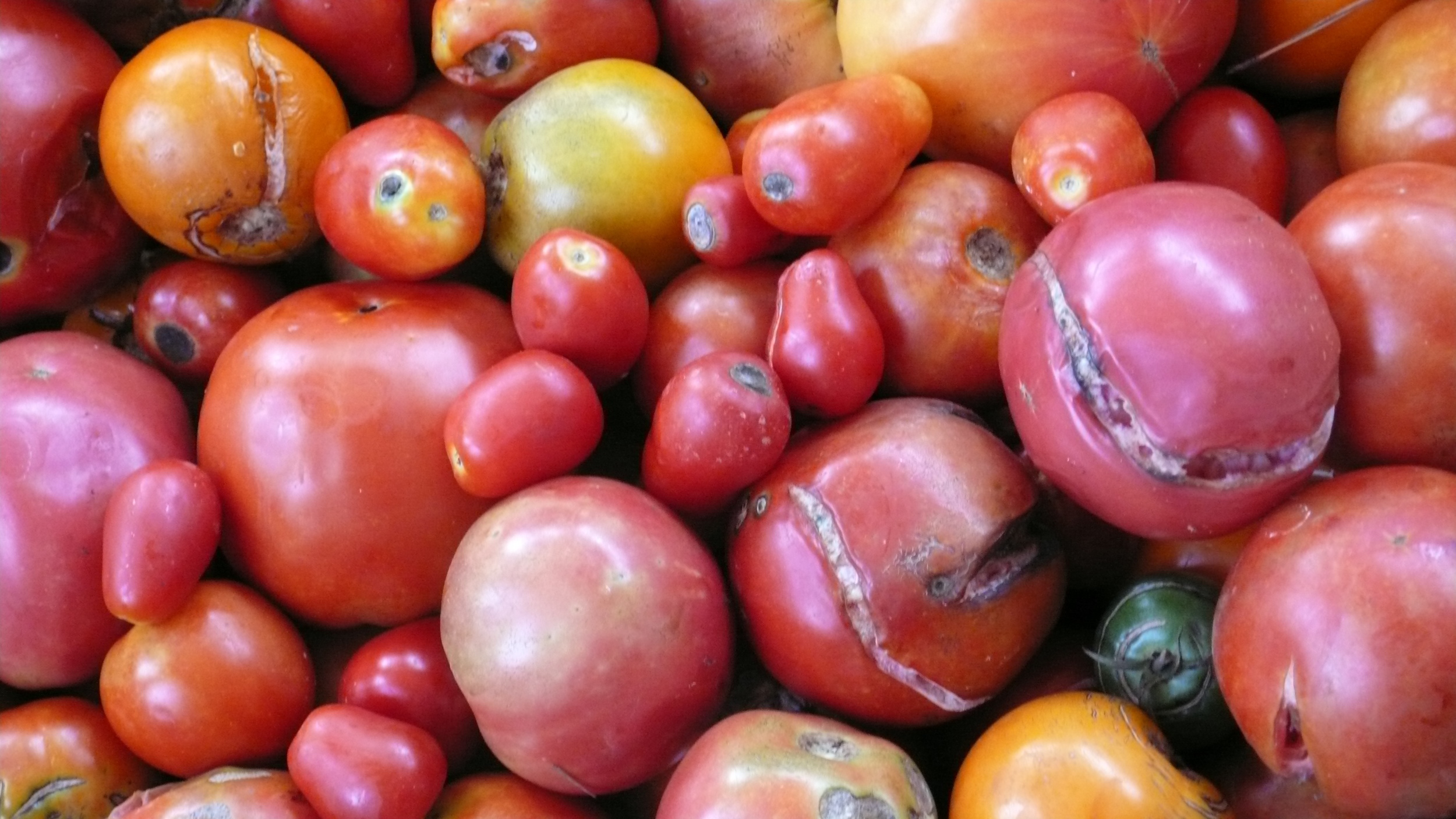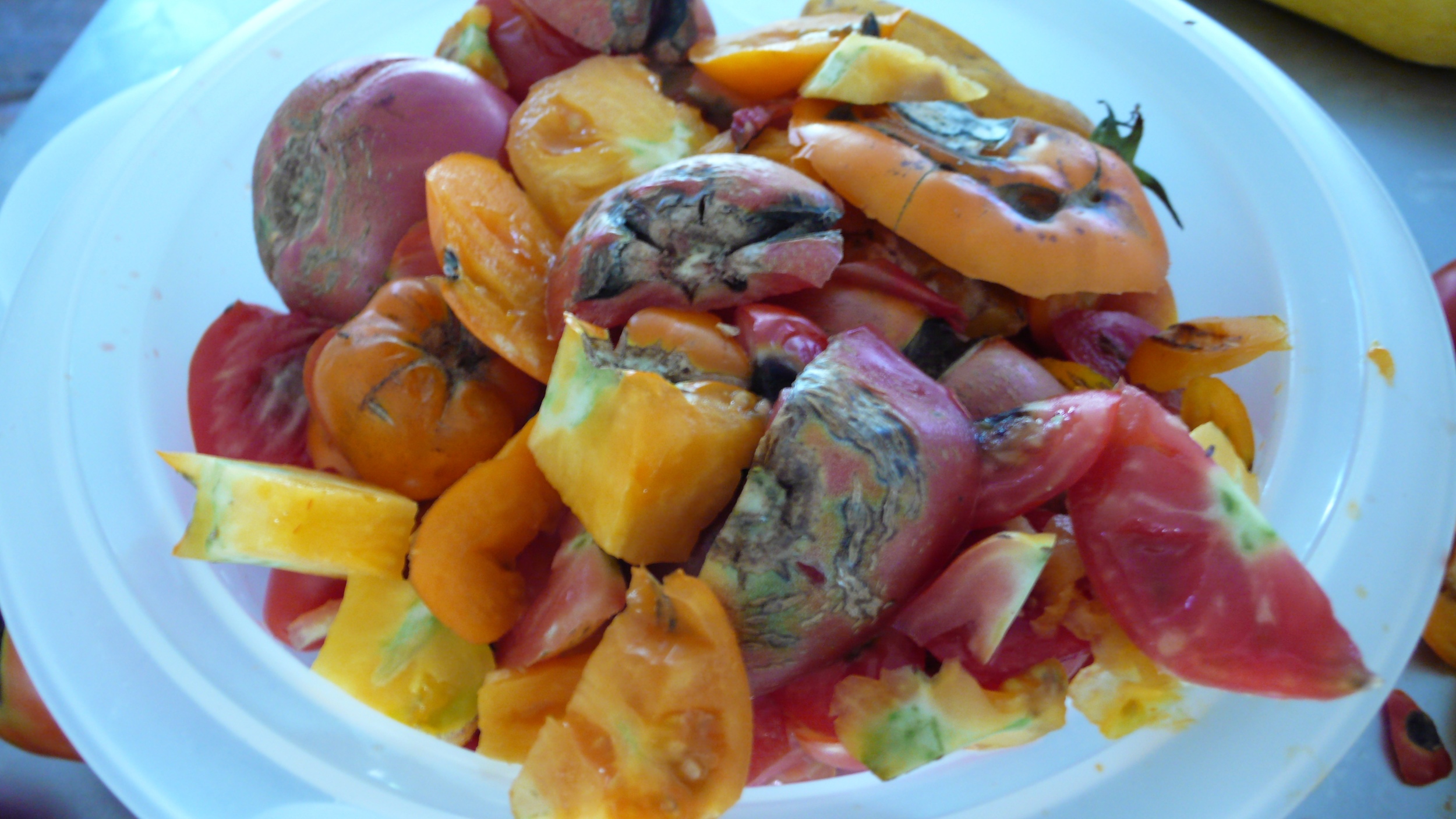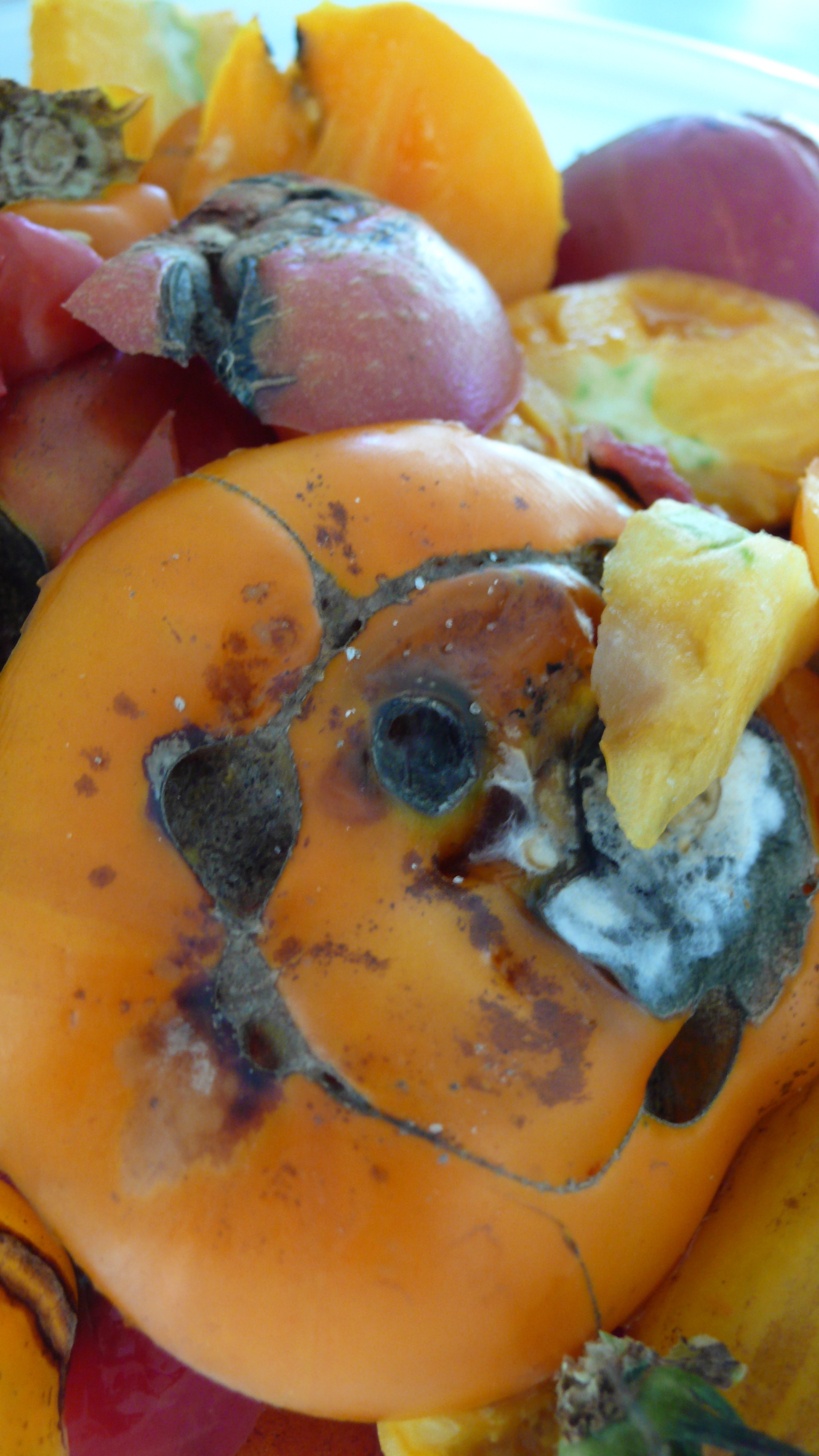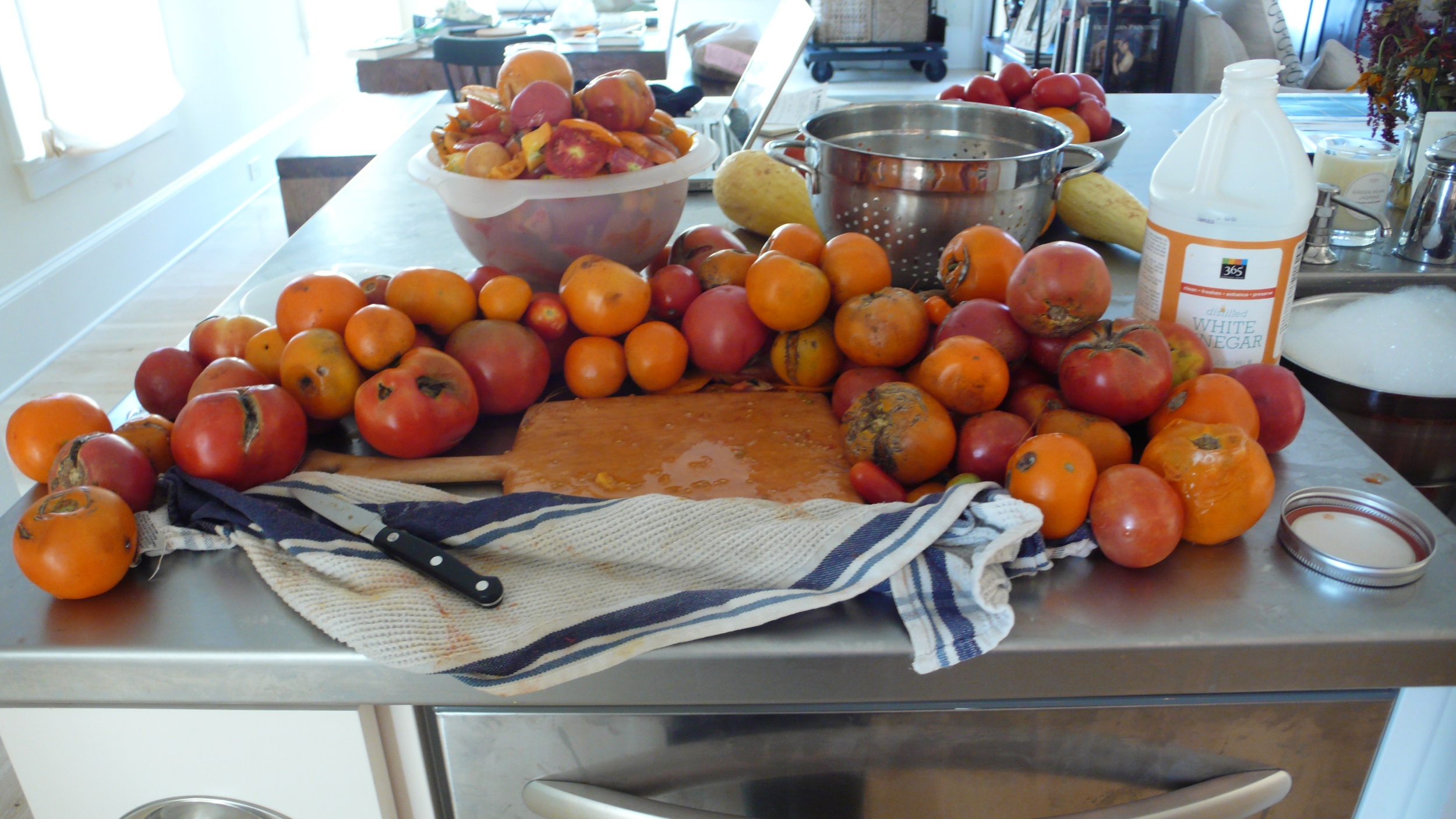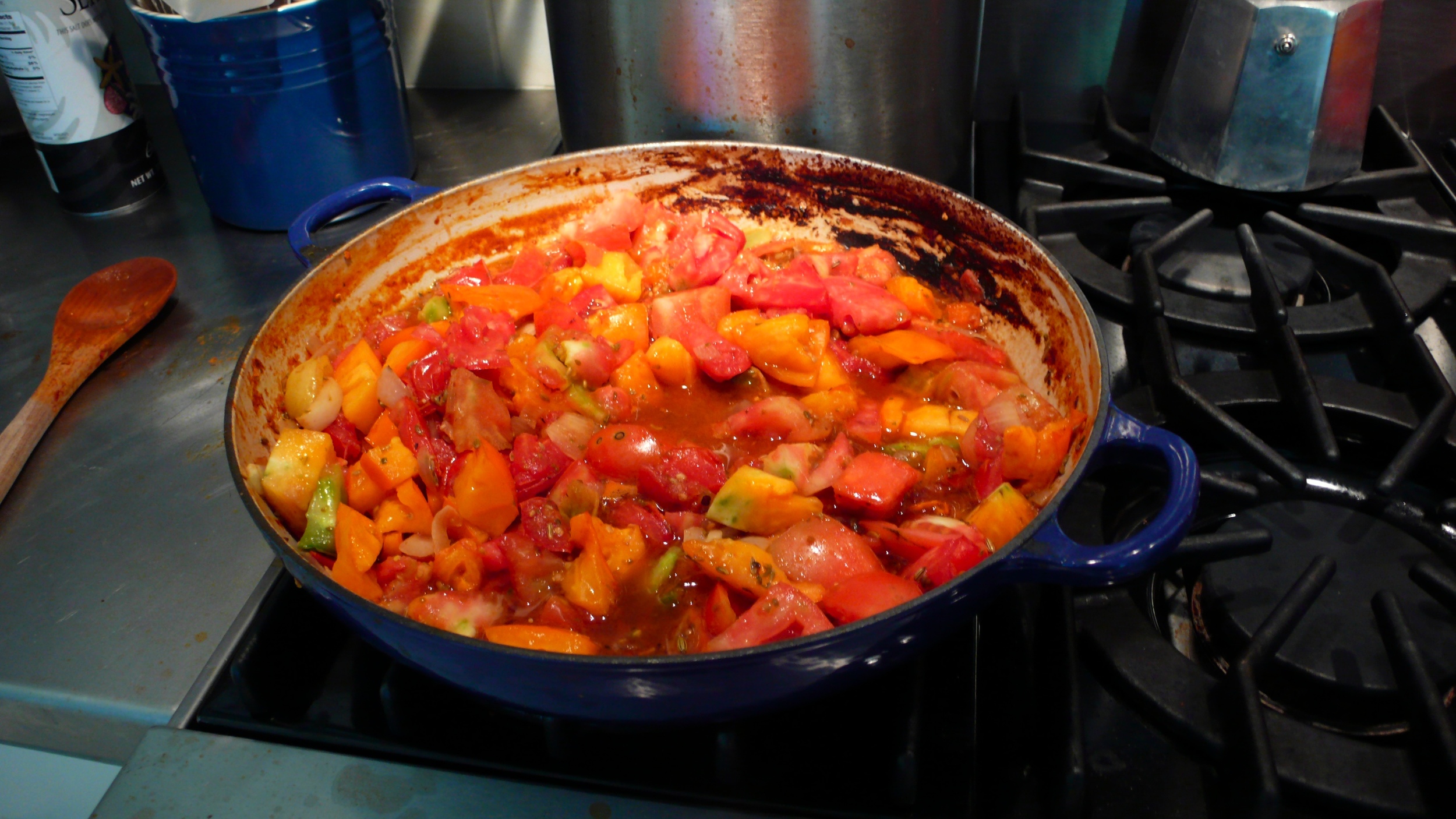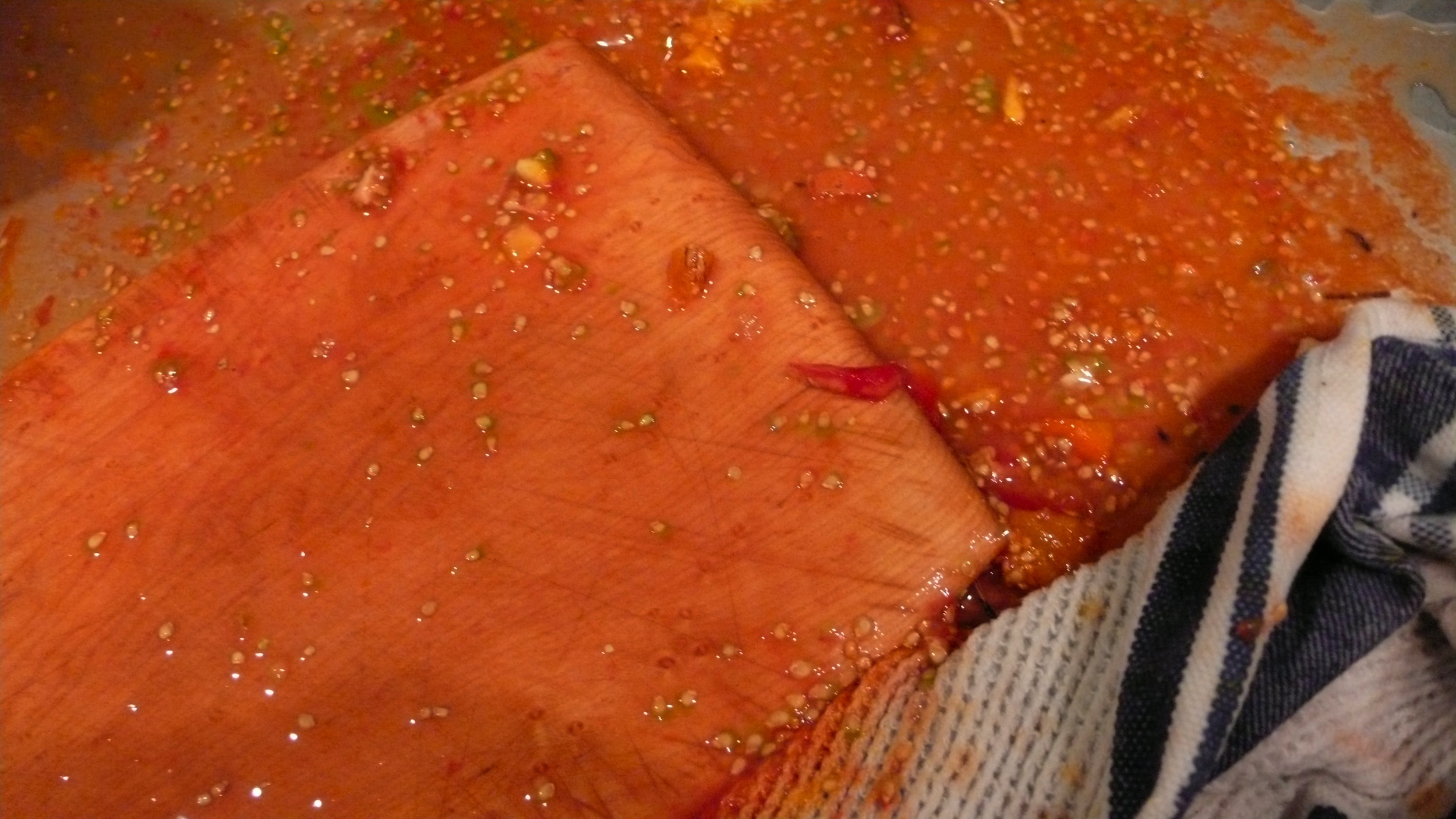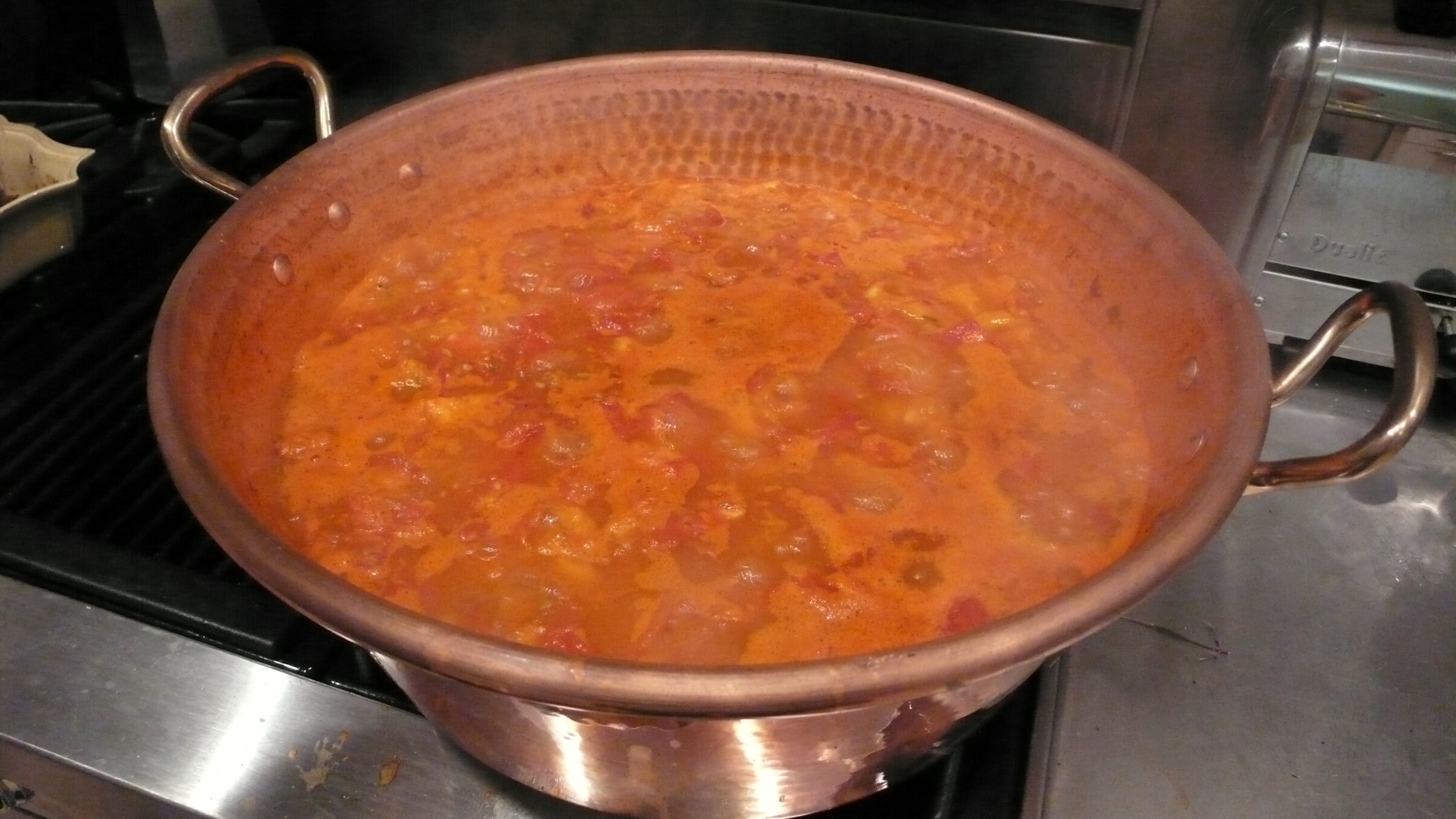we have sheep: the complete tale
So, as indicated by the previous post, we have our sheep. At last. They are wonderful, peaceful animals… nervous, but peaceful. Here is the riviting tale: We awoke at 5:00am to have some breakfast and collect Frankie who was going in for a neuter while we were going to be away from the farm. We chucked him into the back of my station wagon and arrived at the vet's by 7:00. We returned to the farm by about 8:00 to finish preparing the trailer and finally we were away by 9:00. The drive up to Rapidan, Virginia was a grueling 11 hours in our awesome but loud F350 with some seriously rigid seats. We had meant to arrive just outside of Rapidan the night before we were scheduled to pick up the sheep, but we ended up cowering in a roadside hotel laundry room about 100 miles short of our intended destination due to about three tornados touching down around us. As we fell into bed that night, we were seriously grateful we decided to pull over when it started hailing and that we didn't have the sheep at that point.
After another 5:00am wake up call, we arrived at Everona Dairy around 9:00 to a queue of East Friesians in a chute that we were told were ours that looked waaaay too big to have been born in February. Turns out they were indeed the wrong ones. We had anticipated based on our email communications that Dr. Elliot, who is a breeder of good repute in the dairy sheep world, had picked out a group of 15 ewes with good genetics, including two rams of different lines. How wrong we were. We spent the next few hours rifling through several sheets of semi-complete records on two groups of lambs, picking them out by the ear tag number to get a good look at them, only to find that after we had grabbed, looked, and released, that we would be catching the individuals by hand rather than running them through the chute to sort. Basically, due to a number of miscommunications, we hand to hunt and peck for ear tag numbers for the same sheep twice. We did not have the sheep loaded until after 12:00. Small, but wonderful consolation was that Dr. Elliot's son, Brian gave us ample slices of his warm, home-made lamb sausage and a lovely chunk of herb-crusted Piedmont (Everona's signature cheese) for the road. It was a phenomenally delicious little farm lunch. We are riding on the hope that our little lambs will help us produce food as good.
After our morning adventure, we drove about an hour south east to pick up a group of Katahdin sheep from MyArk Farm. This was a much more straightforward experience, mostly due to the fact that Katahdins, as meat sheep, are not as valuable as dairy sheep and so long as your working with a good breeder, a bit less care can be given to the selection process. We actually ended up taking their entire crop of ewe lambs. Though some were less perfect than others, our thought is to go with all of them in order to gain experience with whatever they end up being and doing. It should be fun.
So, after picking up and loading up everyone, we were ready to take our new babies home. Our original plan was to be finished with everything by about 12:00 to give ups plenty of time to get all the way back in one night (arriving late, but not too late) so the sheep did not have to spend a night out on the road. But, since we didn't end up pulling away from our second pickup until 3:00, we prepared ourselves to find a safe place to stay for the night. I did not want to stay in a hotel with my sheep sitting in an anonymous parking lot by the highway. It felt vulnerable. Ultimately, we headed south toward Greenville where Ross' uncle lives on a cul-de-sac with enough room for a trailer. I am so grateful for their generosity for letting us arrive at 11:00 at night, watering the sheep, and providing us with a free bed. It was really a godsend.
The ride itself was quite its own adventure. I-95 with a livestock trailer full of precious, precious sheep is NOT a fun place to be. Remember, I-95 is the same road that, in New Jersey, is the New Jersey Turnpike, the single most hellatious road I have ever travelled on. Well, it seems that the Turnpike extends its negative influence all the way down the eastern seaboard. The lanes around Richmond, VA are horrifyingly narrow, the road is in ill-repair (bumpy, grated, cracked, and generally uneven), and everyone seems to be hauling something (yachts, cars, semi-trucks, the contents of a small household, ass). We pulled off as soon as we got clear of Richmond and decided to take a parallel road. No joy. It was a suburban wasteland filled with strip malls and the obligatory traffic lights. Unpleasantus maximus. We were actually delighted when we finally reached I-85. Let me tell you, hauling a livestock trailer with 32 sheep in it on the connector through downtown Atlanta was a totally surreal experience. Come to think of it, it probably wasn't a legal experience; we probably should have gone around on I-285 with the rest of the truckers.
But we got there in the end. We unloaded them and tagged the ones that didn't have one. They have been rotating through our smallest pasture since their arrival and should be ready for their first big move later next week. Thus far, we've only had one serious mishap (knock on wood!). Franklin got a little too playful with one of the ewe lambs and seriously hurt her leg. She will be fine; she's living in our basement with another sheep for company while we nurse her back to health. We've christened her "Cookie" for being such a tough cookie. Frankie is in a better situation where he has less access to the lambs, but can still bond with and protect them properly. Every day is this intense learning experience, making changes, shifting things, figuring out a better way to keep everyone safe, healthy, and happy, including ourselves.
This whole learning curve we're riding here feels a bit like playing The Oregon Trail, only _for real_. It's like I'm constantly circling the wagon going "is everyone ok? all alive? no snakebites? no dysentery? cool, lets get moving at a strenuous pace." Every time I hear coyotes at night my heartbeat quickens; I pray the fences are strong and that the dogs are diligent. I have never hoped and prayed like I have since so many lives have been in my care.
spring fever
I'm writing this from my kitchen counter on a rainy (again) afternoon feeling the restless tension of a Spring that is coming, but has not yet come. Daffodils are pushing up, the grass is growing; I walk the pastures and see lush, vivid patches of clover just waiting to be munched by our sheep; our sheep, which, like Spring, are not quite here yet. We anticipated their arrival in March, but the ewes dropped a little late and so our lambs are still too young to come to their new home.
We've started rotating our seven borrowed sheep through one of the pastures. It's sort of nice to get to practice some of our systems on a small group before our large group of permanent sheep arrive, and while Franklin appriciastes that he has a job to do while we're waiting, I am experiencing a kind of anxious listlessness: I am chomping at the bit, rearin' to go!
Amidst this lull in farm activity, I feel the need to give myself a moment to reflect on everything that has happened since January and to take stock of where we've been. I've compiled a list:
- arranged for acquiring 15 ewe lambs and 1 ram lamb of dairy genetics
- researched and contacted farms selling lambs with meat genetics
- purchased 160 baby chickens and raise them
- designed logotype and print business cards
- designed fencing system, hired crew, and got fences built and electrified
- moved a telephone pole/ fought with the power company
- demolished a house (after removing the more useful items and the rest of Chattahoochee Hills removing the less useful ones)
- learned how to use a generator and that corn-subsidized ethanol in gasoline destroys small engines
- purchased a truck
- purchased a livestock trailer
- purchased a flatbed trailer
- purchased a tractor
- clean out barn (12 ft dumpster's worth of crap!)
- hauled over a ton of old metal to recycler
- built a portable chicken house
- wired the red barn for electricity
- acquired two livestock guardian dogs, one via airport, one via 6-hour drive
- lost and retrieved two livestock guardian dogs
- begun working with an architect for the creamery
- had one big face-to-face meeting w/ dairy consultant plus lots of phone calls and emails
- solidified cheese types and initial make procedures
- made our first sales commitment for eggs
- attended the Georgia Organics Annual Conference
- registered with USDA/FSA for grants
- hosted two farm volunteer days
- acquired a business license
- repiped the spigot on the well
- been to home depot about a bazillion times
- re-roofed and replaced rotted wood on red barn and hey barn (as of today!)
I know there's a load of stuff I'm forgetting, not to mention the minutia involved in every one of these activites, plus daily chores and other "life activites" such as eating, sleeping, and doing laundry, but it's all been seriously, seriously awesome. I really, honestly can't wait for it to get busier! Bring on the Spring!
zen and the art of keeping chickens
Over the past few weeks we have been raising up our first flock of chickens. The little balls of fluff that arrived in a cardboard box at the Palmetto Post Office on a cold Sunday afternoon (the postal worker told me I had to come get them before 4:30 because she had a cake in the oven and had to get home to take it out–- how much do I love living in a rural community?!) and just last weekend we moved them out of the brooder house (i.e. garage) and into their permanent portable chicken house out in the pasture. They have just exited their awkward semi-feathered stage and are entering full-blown pullet-hood.
These birds are so much fun. I've spent an unusually large amount of time just watching them. I can watch them for hours, given the chance. I find myself saving chicken-related farm chores for the very end of the day so I can take my time with them and just watch them. It's hard to describe the mesmerizing effect they have on me. It's not that they're doing anything particularly interesting, I mean, they're chickens, not The Bourne Identity, and yet somehow, I find them just as riveting. So when I came across this article by Peter Lennox titled Pecking Order at the Times Higher Education website, I began to understand their hypnotic power over me. Lennox writes,
Watching chickens is a very old human pastime, and the forerunner of psychology, sociology and management theory. Sometimes understanding yourself can be made easier by projection on to others. Watching chickens helps us understand human motivations and interactions, which is doubtless why so many words and phrases in common parlance are redolent of the hen yard: "pecking order", "cockiness", "ruffling somebody's feathers", "taking somebody under your wing", "fussing like a mother hen", "strutting", a "bantamweight fighter", "clipping someone's wings", "beady eyes", "chicks", "to crow", "to flock", "get in a flap", "coming home to roost", "don't count your chickens before they're hatched", "nest eggs" and "preening".
It's really, really true. There is something about watching these feathery creatures that clarifies the human condition. These birds elicit a zen-like inner calm. It's as if the chicken, a creature so utterly and helplessly in-the-moment, transfers a part of its most central nature to its watcher; this central nature, is bound up in the fact that,
Humans got the mental wherewithal to try to control everything; the chicken's future rested on being tasty. Chickens are thus relieved of an enormous responsibility, making their lives simpler. They don't have to organise the whole world, or attend meetings to discuss policies "going forward"; they don't have to invent the future continually - it just comes when it comes.
It is therefore a serious relief to watch chickens. They serve to remind me that the great responsibility of "inventing the future", which is precisely the thing I am finding myself constantly engaged in as I build this farm, is all a bit silly. The "I'm running a business here" mentality I have been know to affect melts away in the chicken house as does (quite blissfully) the time I could be spending doing other things. When I watch them, I am learning, among other things,
competition without co-operation is nonsense; you can't win by simply eradicating all the opposition - that's a pyrrhic victory. In life, winning really isn't everything - it isn't even anything. Taking part is all.
Reward and risk go hand in hand. The top cockerel has to take the biggest share of both. A flock can manage without a cockerel, but a cockerel without a flock is nothing.
A flock can keep you warm, inform you about dangers and advantages, and provide you with companionship; but you have to work at it.
Everyone should have a place in the pecking order. Strive for your place in life, not someone else's. Someone else's bread isn't necessarily tastier than your own. Envy will cost you dearly.
Don't let "flock-think" smother your own opinions; give yourself space to be an individual. Common sense is useful, but it's not always right. The society you're in may prompt you to behave badly, but only you can change that.
I can't wait to start entertaining requests for hosting corporate retreats at the farm with required chicken watching. . . Go read the article and start spending time with chickens. It's good for you and it's good for business. And of course, in the meantime,, you can enjoy watching them here:
meet Franklin
Sheep are tasty. They are small and not terribly smart, making them quite easy for a predator (human, canine, feline, or otherwise) to get hold of one and enjoy. However, humans have taken it upon themselves to horde sheep for their own, private consumption. In return for their meat, milk, and fibre, we provide sheep plentiful sources of food and water, along with protection from other creatures that find them just as delectable as we do. This is, essentially, the sacred contract of farming with livestock. In return for their lives, we provide them with food, water, medicine, protection from predators, humane treatment, and a humane death. Consider for a moment which you would rather have happen to you: coyotes kill an animal by opening the abdomen and eating the internal organs, wild dogs will maim to death slowly and violently. Humans kill animals, when we do it correctly, by either stunning with a single blow to the head or else slitting the throat with a sharp knife. Neither is pretty, neither is fun, but you get where I'm going here. The same goes for food and water. Food and water are precious amenities in nature that often shift, dry up, or are otherwise of limited access. Most wild animals spend every minute of their waking lives looking for food. Part of the deal when one raises livestock is that food for the stock is always provided and is easy for them to get. Temple Grandin, whom I love and write about often, says that nature is harsh, but we don't have to be. Agriculture itself is a kind of insurance against the harshness of nature. It is still very much at the mercy of nature, but it allows us some respite from the daily struggle to fill one's belly. Part of how we keep the harshness of nature at bay for animals is by providing them with a similar respite as well as protection through the use of guardian animals.
Guardians are an essential part of any farm that raises small animals. Dogs are the most common and have been used for this purpose the longest. There are literally, a bazillion different breeds of guardian dog, each bread for its home region, type of stock it is works well with, specific behaviors, and specific temperaments. In addition to dogs, farmers have also used llamas and donkey's as effective guardians. For a long time, Ross and I thought we would use llamas to guard our sheep. That all changed, however, when we met Nancy Osborne of Cordero Farms when we were in Vermont last summer. Nancy told a story about the dogs that guard her sheep. Apparently, her farm lost power during a big, midwestern snowstorm. Nancy had painstakingly sorted her sheep into different breeding groups and put a dog with each group. Because of the loss of power, she was convinced that she was going to have a very long couple of days re-sorting everyone. How wrong she was! The dogs not only kept the sheep safe while the electric fences were out, but kept each group of sheep together and separate from the others. This sold me completely, not just on using dogs, but on using a particular breed: Maremmas.
In a nutshell, Maremmas are the Italian version of the well-known Great Pyrenees. They are big, white, bushy dogs with calm demeanors but formidable when they or their charges are threatened. The main difference between the two is that the Pyrenees was bread to guard a perimeter; thus, they wander, sometimes quite far, and don't generally stick with the stock. Maremmas, however, develop a strong bond with their stock and stick with them.
I spent the better part of the past few months learning about these dogs, watching information and questions pass through Maremma list-serves, reading, and talking with breeders and other farmers who keep them. Through this process, I was able to find Frankie.
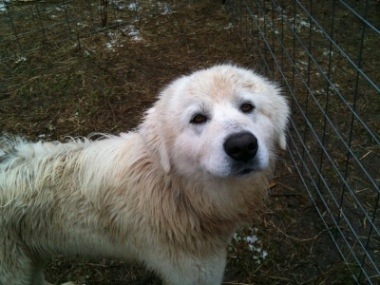 Frankie, is an 18-month old Maremma from Washington State. He is an amazing dog. In preparation for his arrival, we borrowed three sheep and six lambs from a neighbor for him to look after until our sheep arrive. It took Frankie a while to adjust to things here. He arrived via 747 jet, clearly a bit traumatized from the experience and wondering where the heck his mom and sheep were. I'm sure he also had a bit of jet-lag; he was quite sleepy for several days. His transiton has been less than perfectly smooth. Due to his privious owner's schedule, we had to take Frankie about two-weeks sooner than we were really ready for. I wanted to make sure all of our fences were up before we brought a dog to the farm, but that didn't happen and on Saturday, we paid the price.
Frankie, is an 18-month old Maremma from Washington State. He is an amazing dog. In preparation for his arrival, we borrowed three sheep and six lambs from a neighbor for him to look after until our sheep arrive. It took Frankie a while to adjust to things here. He arrived via 747 jet, clearly a bit traumatized from the experience and wondering where the heck his mom and sheep were. I'm sure he also had a bit of jet-lag; he was quite sleepy for several days. His transiton has been less than perfectly smooth. Due to his privious owner's schedule, we had to take Frankie about two-weeks sooner than we were really ready for. I wanted to make sure all of our fences were up before we brought a dog to the farm, but that didn't happen and on Saturday, we paid the price.
While we were working on building our chicken houses with a group of volunteers, Ross and I both heard a yelp and saw a flash of white coming down the hill from the barn where the borrowed sheep were. Frankie had gotten out. My theory is that he jumped out of his pen to get nearer to the sheep. The sheep were inside a temporary electro-net fence. Frankie's pen was just outside this fence. We think Frankie must have touched his nose to the electro-net, got a shock, and took off in the opposite direction. Ross and I both yelled "shit!" and took off after him, leaving our poor volunteers quite bewildered. However, once they figured out what was going on, they sprang into action, either following after us or jumping into cars to go patrol the roads. We were able to find him after about half an hour of searching. He had made his way over to our neighbor's pasture, across the creek, and had nestled himself on the side of a steep ledge. The relief I felt was profound. We had him. But a new tension was emerging in me: how in the world were we going to get him back? After looking and talking for a few minutes, we could not figure out a good way to get him down. The whole time, I was just so worried; Frankie had been with us only two days. He had no idea who any of us were or what we were asking him to do. It was not hot outside, but he was panting from stress and several times looked as if he was going to fall asleep standing up. We were all stressed as we floated ideas, tried to get Frankie to come along, only to have it fail. We called our friend Chip, who had been helping us with the chicken houses. He's a firefighter, and so I figured he had some good expirence with these types of rescue missions. My hunch was right, after quite a lot of discussion and a series of failed attempts that only stressed Frankie further. Chip's idea to dig down from the top of the ledge to make it less steep so Frankie might be more inclined to hop up safely worked. Again, there was a sense of huge relief. We breathed again and cheered. Chip took a big, celebratory swig of Gatorade. Ross started walking Frankie through the woods back towards the farm. We thought the long struggle was over. My friend Lauren and I went back up to the barn to reconfigure things so that he would not be able to get out again. After we finished, though, Ross and Frankie had not appeared. Something was wrong. Lauren and I walked down the road towards the bridge that crosses the creek where there seemed to be some activity. The bridge. The damn bridge. Frankie would not cross the bridge. The floor of the bridge is grated steel, something we knew we would have to fix for the sheep to be willing to cross it, but we did not anticipate a dog having such an adverse reaction. In the fray of trying to get him to cross, Frankie had come out of his collar, which made matters more tense. Chip and I hopped in the truck to go get another collar, a long lead, and some wet dog food that would hopefully entice Frankie back into his crate, which we finally resolved, was the best way to move him at this point. It was slow going to get him to accept a new collar and lead and even slower going to get him into the crate. He would not eat the wet food, so the idea of luring him was out. Ross and I spent much of the time just sitting with Frankie, waiting for him to calm down, showing him that we were calm and trustworthy, but this did little to help us progress. Finally, our friend Lauren, who had done some work in vet school and worked in a vets office for several years coached us through forcing Frankie into the crate as carefully and gently as possible. We latched two leads to Frankie's collar so that he could only move forwards and backwards and moved the crate to be directly in front of him. Lauren got behind Frankie, pushing his bum with the side of her foot and gently lowering his head into the crate. Slowly. One. Foot. At. A. Time. He was in. Sweet, sweet relief. We got him. He was safe. Stressed, to be sure, but safe.
The whole process, start to finish, lasted from 2:00pm to 7:00pm. When we got Frankie back up to the barn and settled, Ross bent over and nearly vomited from stress. I gave Lauren a huge hug. I don't know if we could have do it without her help. Afterwards, as I sat there and blamed myself for the mistakes I had made in assuming Frankie would not jump out of his pen and in accepting a dog before our fences were ready, Lauren very kindly and wisely pointed out that this process probably helped Frankie to bond with us, especially Ross. Lauren said she did not think Frankie associated the stress of the afternoon with us. Rather, we were the ones who were with him during a difficult time. I noticed at one point, when we were trying to get Frankie to move in the direction of the crate without a lead, that he walked when Ross walked, and he looked back at Ross every time something changed, as if to ask "is this alright?" It was amazing to see.
What was even more amazing were my wonderful friends and neighbors who helped get Frankie back. Our neighbor, Fuller, without missing a beat, jumped into his truck with Ross to go looking through the pastures. Chip and our neighbor Sarah immediately went hunting for Frankie, offered help and suggestions and stuck with us to the very end. Carter and Laura stayed with the chicken house and kept framing while the search and rescue team went out, erecting the back wall entirely on their own; and our dear Lauren, without whom we would probably still be out there, trying to coax Frankie into his crate. Living out here, doing farm work, I am continually amazed by the generosity and fortitude of the people around me. This kind of thing is the stuff that community is made of. I am so, so grateful.
Frankie is currently doing well. He's out of his pen and with the borrowed sheep. Already he is exhibiting protective behaviors with them, keeping them where they belong, watching them, looking up at any sound or disturbance. He's a wonderful dog. We really got a sense of his character and demeanor on Saturday. The characteristic calmness of Maremmas shone clearly. Frankie could have freaked out with us so many times, but he didn't. In all his stress, he remained quite calm and even submissive at times. He is eating heartily now and enjoying firm butt scratches from us. Now that he's had almost a week to adjust, we are going to begin the real work of training him to us and to our farm. We'll keep you posted.
things are easier to destroy than to build
The house on the farm is gone. After word got out that we were planning to demolish it, it was scavenged to its bare bones over the course of a week. Finally, the might and force of a track-hoe dealt it a final blow. Ross and our friend Clay were down in the hay barn cleaning up when they heard a resounding "BOOM" unexpectedly on a Sunday afternoon. Apparently they wanted to get things going before the anticipated snow. I came over with a video recorder:
I was struck, as I videoed the demolition like a tourist, by a sudden and profound sense of responsibility. My choices wiped away someone's home, and with it, physical manifestations of a memory. Now there is a flat, graded patch of red clay in its place. Despite the consent that comes when a piece of property is bought and sold, I could not help but feel a small pang from the loss, from the gone-ness of the thing. And beyond that feeling came the feeling of responsibility to do right by the place, to build and create something that could justify the destruction occurring before me.
I had always been aware of the responsibilities that come with land-ownership and farming. There is a commitment on a multitude of levels, and for both me and Ross, a profound intention to recreate the land and to assist it to become something better than when we found it. A mere 100 years ago, there was not a tree to be seen where our farm is, in all of Chattahoochee Hill Country. It was all cotton. Everywhere you go, you see ripples in the landscape from trellising and the red clay, indicative of spent soil. All of the dirt that was here was literally spun away into cloth of which there are only scraps left. As I stood and watched this house fall down, I remembered that there is a human element to this responsibility; thoughts, memories, hearts, and minds all needing to be seen, heard, and understood. Mateo Kehler, of Jasper Hill Farm makes some of the best cheeses in this country, if not the world, and he has a proclivity for naming them after the people who were on his farm before him. According to their website:
Constant Bliss [was] a revolutionary war scout killed in Greensboro by native Americans in 1781. He was guarding the Bayley Hazen Military Road with his compatriot Moses Sleeper, who died with him.
Three of Jasper Hill's cheeses are named, Constant Bliss, Bayley Hazen, and Moses Sleeper. This always struck me as a wonderful naming scheme for cheese, but it never quite consciously occurred to me why. As I watched our neighbor standing and watching, it drove home to me that when you farm, you have to respect the land in and of itself, but you also have to respect its people who have shaped it, for better or for worse, and the memories that hang over it.
These memories have to be respected with the land for a reason that did not fully impress itself upon me until just this past weekend when I was attending the GA Organics Conference. While there, I had the opportunity to go to a screening of the film Dirt: The Movie. The film, as you might imagine, is all about dirt, dirt and the human relationship to it. As I watched footage of farmers running from dust storms in the midwest, or else digging themselves out of the heaps of dried out, worn out topsoil that was forever leaving them, I thought of what it took to build that soil. How many plants and animals lived and died on that land to build up the humus, the fertility, the "black gold" as it was advertised. How many aeons did it take? And then, in the blink of an eye, in a single lifetime: gone. Just gone. I remembered as I watched those scenes my own words as I watched the house disappear into big green dumpsters, I looked over at one of the guys on the demolition crew, smiled, and said, "it's easier to destroy something than it is to build it, isn't it?"
A memory is no different from the soil. If abused, neglected, or mistreated, it is lost. It does not ever come back. It takes a lifetime to build, but in a moment, can be gone. I've come to understand over the past two weeks, how inexorably linked the land is to ourselves and our histories, the very things that make for a culture.
I think farming, is at its heart, a series of alternating moments of creation and destruction. I remember, several years ago now, standing in a greenhouse, thinning seedlings, killing little plants so that other plants can grow stronger and healthier; and again, this past summer, thinning radishes and carrots, talking with my neighbor as she and I both struggled with killing the little carrots and broccoli's we had nurtured for weeks so that the strongest ones would be stronger. With animals, the feeling of culling is more intense. We culled our first animal yesterday. One of our chickens had developed a serious infection in both of her feet. Her feet had doubled in size with swelling, and parts were grey-black with necropsy. She was clearly in serious pain. Ross and I were both tempted just to remove her from the rest of the flock, set her down, and let her die, but the cold and the anxiety would only increase her pain. With a flick of her tiny neck she was gone. Weeks and weeks she grew, then, in an instant, she was gone.
Farming is so powerful. The first farmer Ross worked with, saw himself as an agent of destruction, an agent of death, not as some romanticized, pastoral creator and protector of beauty. He was absolutely right to do so. This job and this way of life can be awful. That power to destroy, to end the existence of a thing, is not a responsibility to be taken lightly. But we do it, or I do it, because each choice to end something or not, I think, has to be about the creation of something more beautiful. Any artist will tell you that most art is a series of mistakes and corrections. Lines get culled by other lines or eraser marks or a different color laid over. This process continues until the artist gets to a point of some kind of satisfaction, so that every line, shadow, and color ends up where it belongs. This is farming exactly. You are constantly shaping, reshaping, killing, breeding, altering systems, trying to get things into some kind of shape that makes sense, that works, that tells a story, even. The reason that it is easier to destroy than to build, perhaps, is that building and creating is made up of a series of destructions.
I am realizing the full power of this process, the care one must take in each of those choices. The land, the people, memories, stories, all of it has to be considered. I am beginning to get a taste for what Joel Salatin means when he calls himself a "caretaker of creation." To be such a thing, you must be many things, you must nurture and protect, but most importantly, you must also be an agent of destruction.
manyfold farm
Here are the first photos taken of the farm since it has passed into our hands to become Manyfold Farm. I was out taking soil samples today in this amazing, balmy January sunshine. Ross worked a bit on the well to install a spigot so we can provide water to our soon-to-be-here chickens. Step by step, we're moving along. . .
awash in a sea of tomatoes
Last week I canned and I canned and I canned. I traded a gallon of milk with Farmer Paige for about 40 pounds of tomato seconds from the farm. So many tomatoes. I put up a total of 10 and a half quarts of plain tomatoes, and another 10 quarts of tomato sauce. By the time I got to the last of them, they had started to ooze and mould beyond the point of salvation, so the compost got a little bit extra fermented goodness this week. The photos really speak for themselves:
